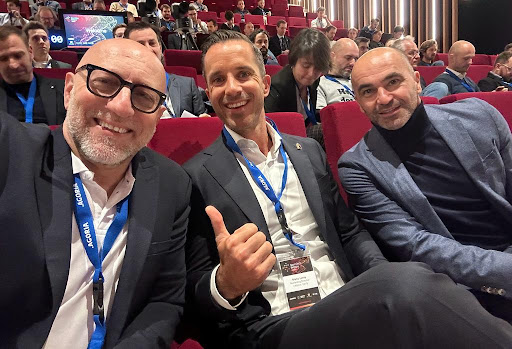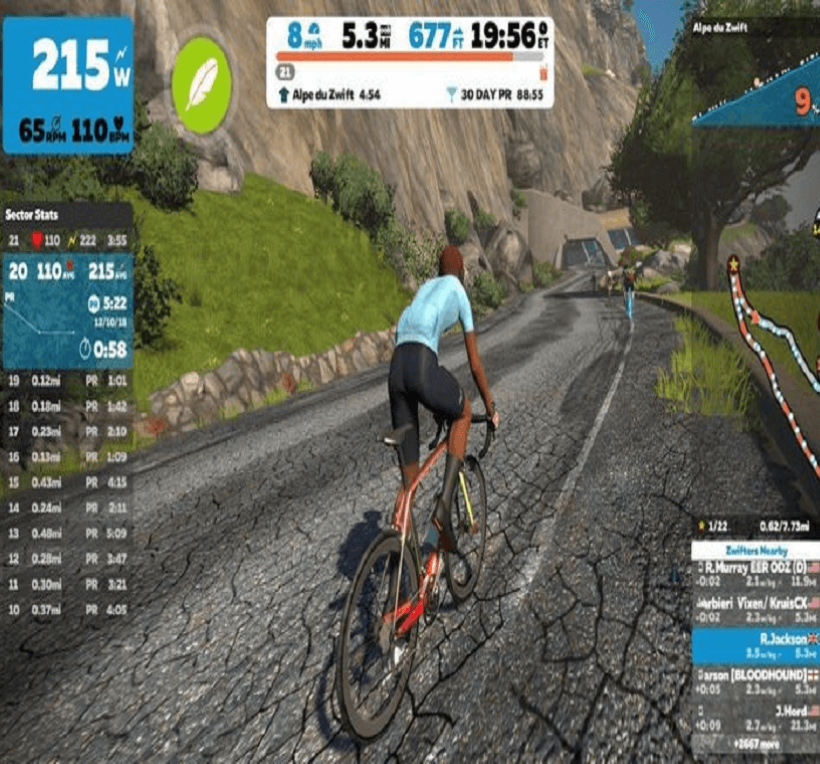

Who Owns the Data (Next Big Thing) in Sports?
What I Learned From Roberto Martinez – Belgium’s Head Coach
Who Owns the DATA (Next Big Thing) in Sports?
What I Learned From Roberto Martinez – Belgium’s Head Coach
Imagine owning the only data-powered NFT for LeBron James’ last-ever performance or for Lionel Messi’s World Cup-winning display – revealing the next big monetization opportunity in sports waiting to be unleashed.
Two weeks before the start of the FIFA World Cup 2022, I had the chance to personally meet Belgian national team head coach, Roberto Martinez, at the SportsTech Belgium Summit. Martinez had plenty to say on the future of sports innovation, and he elaborated on how his side uses analytics all the time, both data and video analysis during the game itself and at halftime to provide players with deep insights from the match. The Belgian national side was even hoping to use 3D glasses on the pitch for real-time analysis during the World Cup finals in Qatar, but lack of requisite approvals put an end to such meteoric plans. Subsequently, he touched on the potential challenges faced by the ownership of data in sports; on how athletes are frustrated with the lack of accreditation when it comes to their performance data and their ongoing pursuit behind the scenes to lawfully own it.
This is when I learned about the “next earthquake in sports business.” Let’s take a deeper dive and tackle the issues at hand for the next big chapter in sports innovation.
Three Main Problems:
- Who actually owns the data?
In modern-day sports, we can hardly overemphasize the importance of data in order to succeed – whether that involves to get the better of the opponents by using data analytics or scaling up the revenue and even grow one’s fanbase. With the relentless rise of innovation in the industry, the application of data in sports is poised and well-placed to only grow in numbers for the unforeseeable future. But as an industry in its totality, sport is yet to fully address the subject of data from an ownership perspective. Take a moment and think hard about who actually owns the data. Can anyone collect data at professional matches and use it to their needs? Is there a governing body to control the ownership of data in sports? Do professional players get to have a say on how and where their performance-based data is stored and distributed?
Data has gradually become a valuable commodity in a time when statistics and analytics drive performance development and media coverage in elite sports. Add the element of the global betting market and the rise in popularity of in-play betting amongst regular punters, and it becomes hard to look away from the remarkable position that LIVE data is currently placed at.
Just recently, a Hull City fan was threatened to be ejected from the stadium by an ‘undercover security guard’ for texting his friends and relatives updates from the game. While it remains to be discussed whether the treatment was fair and justified, Gary Lineker, for one, felt it wasn’t.
Hull City authorities argued that the fan was involved in ‘courtsiding’. By being physically present at a sporting event, you gain a marginal time advantage over betting companies which has the potential to make or break the disciplined betting and gambling scene – by making an instant bet, or cashing out after the occurrence of an event that prejudices one’s bet.
- Lack of regulation for data ownership
As far as football in Britain is concerned, British media company Football DataCo “represents the data rights of the professional football Leagues in England and Scotland. The core elements of its role are to protect, market and commercialize the rights to official match related data.” Any betting and gaming companies who want to use the ‘official data’ are required to enter into a licence and a supply contract with them.
In this instance, however, there is no property right of information or data in place under English law – owning the intellectual property rights in a database does not entitle the rights holder to prevent third parties from creating databases of their own using the data they gather independently at professional games, the Hull City fan for example. Simply put, no one individual or party can “own” the fact that a player scored a first-half goal or that a goalkeeper made a match-winning save in the dying seconds. Meaning Football DataCo or any other company appointed by the league or the governing body of the sport cannot have a monopoly over the factual data arising from the events at a football match. Having said that, all professional leagues and clubs have certain contractual terms and conditions in place that restrict game-goers and ticket-holders from collecting live data used for any commercial purposes.
- Anti-competitive closed market
This begs the question of whether they have the lawful right to prevent people from gathering such data at stadiums and if so, isn’t it anti-competitive for one company to be the only party allowed to gather real-time data at matches for the betting and gambling markets? The answers to these questions are anything but straightforward with further discussion, assessment, and official guidelines severely critical before sports can orderly regulate law-abiding collection and distribution of data, and live data in particular.
It won’t be surprising if the subject comes before the courts and any decision made against the existing framework will certainly open up a window of opportunities for several rights holders to step into the market and stake their claim to run authorized data gathering.

Three Main Opportunities:
- Are we about to witness a gold rush for data rights?
To generate new and improved revenue streams, professional sports leagues can consider introducing lawful bidding, replicating the model that currently exists to secure ever-rising lucrative broadcasting rights. Third-party companies with the highest bids can seal multi-year data rights deals in a win-win situation, an exciting likelihood that could transpire much sooner than what we anticipate today.
The value of data will only grow with time and many global companies will be tempted by the proposition of owning data rights for the most popular sports leagues for authorized data collection (and distribution), a commendable power that will guarantee larger sums of revenue. But players voicing their opinion on vague and unfair handling of their performance data could lead to further complications in a major turnaround.
- Data protection for athletes
Developed in collaboration with FIFA, FIFPRO have “outlined a player data charter, which includes the rights to be informed, access, revoke data, portability, restrict processing, rectify inaccurate data, erasure, and complain.” The charter was introduced after most players admitted they did not know how or where their personal data was stored.
As we speak, players can’t own, collect or distribute authorized data related to their performances which undeniably raises further questions with respect to the breach of their privacy on a professional level. When athletes, as the absolute owner of their image, can license their image rights to a company, a third person, or his/her sports affiliate, through an image right licensing agreement, why can’t they have the same ruling to effect when it comes to their own data.
- Performance data-powered NFTs
The exploding rise in demand for metaverse solutions and NFTs have also created extensive and profound opportunities to look at monetizing data from different angles. A few years ago, little did we know about the obscure potential of digital assets, whether it’s in the form of virtual memorabilia or in the nature of static or dynamic NFTs. Similarly, we can not rule out the possibility of seeing an upsurge in the popularity of data-powered NFTs. Imagine owning the only NFT in the world for Lionel Messi’s performance data in the World Cup final! Or possessing the only NFT for data of Roger Federer’s performance in his last ever competitive tennis match.
The commercial scope and appetite for such NFT creativity is currently unidentified and one can not accurately pin down the scalability as well as the sustainability of data-powered NFTs but if recent history has taught us anything then it is the simple fact that an overwhelming portion of hardcore sports fanatics are always eager to get their hands on innovative NFTs with utmost excitement, enthusiasm and a willingness to spend in order to create new and original connection with the esteemed teams and the idolized players which they so dearly support. The undeniable factor that tradable NFTs will always have some resale value in the market makes them an attractive proposition for demographics outside sports followers too.
The SIX Big Takeaways:
1. After metaverse and NFTs, data will emerge as the next big talk of the town in sports, and sports innovation in specific.
2. You can bet on the rise in the valuation of data. Betting and gambling markets at large are one of the most enticing and prized areas in sports business today, and data or live data for that matter, runs at the heart of its existence.
3. We are bound to see a soaring breakthrough in exciting opportunities for brands, professional teams, athletes and leagues, and media companies alike.
4. Improved regulations for data protection seem bare minimum at this stage. The general expectation in sports is that athletes will be served with their genuine appeal for a revamp in guidelines for the protection of their data.
5. In some years, we could potentially see multiple independent facilitators for authorized data collection in a free market, as opposed to the rigid yet unorderly monopoly we see today.
6. Innovation is paramount to identify the utility of certain NFTs in sports, data-powered NFTs for example. Innovation and experimentation around NFT initiatives have seen clear signs of encouragement from the consumer end, and their buying behavior and commitment suggest that we’re just getting started.
If you are a startup with a solution to this next big wave in the industry, reach out to us through THIS LINK or contact our GVA 3.0 Program manager HERE.
Stay tuned for more.
Research: Daniel Rabinowitz , Ash Thakur




Comments
binance推薦獎金
Your article helped me a lot, is there any more related content? Thanks!